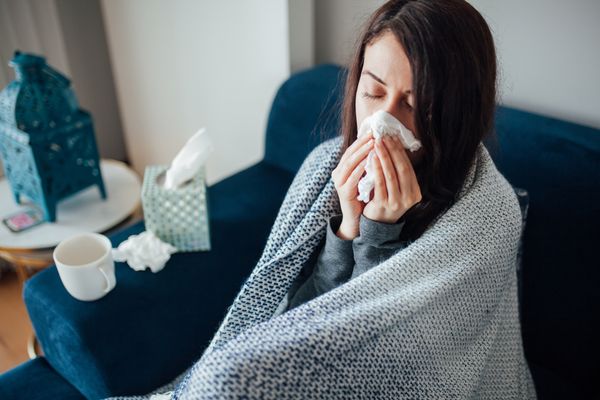Many people forgo flu shots because they're convinced that getting one will give them the flu or make them ill.
That's a misconception, say experts, who stress that while it's true that flu vaccines are made with flu viruses, these viruses are not live viruses—they've been inactivated (killed). They are not infectious, but, rather, are protective.
Read more about flu shot myths.
While the flu shot will not give you the flu, it is possible to get the flu even if you've been vaccinated. Reasons vary:
You might have been exposed to the flu virus before you received the vaccine. Since it takes about two weeks for the vaccine to give protection, the virus may already have taken hold.
The virus infecting you might not have been included in this year's flu vaccine. Research does its best to identify the three or four strains of viruses that will be most common each season, but sometimes they miss—and they can't include all strains in the vaccine. Even so, each year the vaccine prevents millions of cases of the flu and greatly reduces hospitalizations and deaths.
The flu vaccine is not perfect, unfortunately, and it's protection can vary. While it offers your best protection against the flu, it is most effective in healthy younger adults and older children. People with certain chronic illnesses or health conditions might have less immunity, even after being vaccinated. (But it's important to keep in mind that if you do have a chronic health condition, like heart disease, the flu vaccine can lower your rate of some cardiac events.)
The good news is that most people who get the flu despite being vaccinated will get a milder case of it. A recent study showed that the flu vaccine also reduced hospital admissions (as well as the length of stay) and deaths from the flu.
Still others might say they'd rather take their chances. So what if they get the flu? No big deal.
But it is.
The flu is a serious disease, says the Centers for Disease Control and Prevention (CDC), especially for young children, older adults and people with compromised immune systems or certain chronic health problems like diabetes, heart disease or asthma. It's not worth risking it, because the flu can create serious complications that result in hospitalization or, worse, death—even in healthy people.
Although it's best to get your flu shot by the end of October, if you haven't gotten it yet, there's still time. Flu season usually begins to increase in October and November and peaks between December and February. It can last into May, according to the CDC.
Learn more about getting ready for flu season.
The flu shot won't give you the flu. What it might give you is a (brief) low-grade fever or achy muscles while your immune system is gearing up.
And a lot of reassurance that you will keep yourself—and those around you—healthier.







